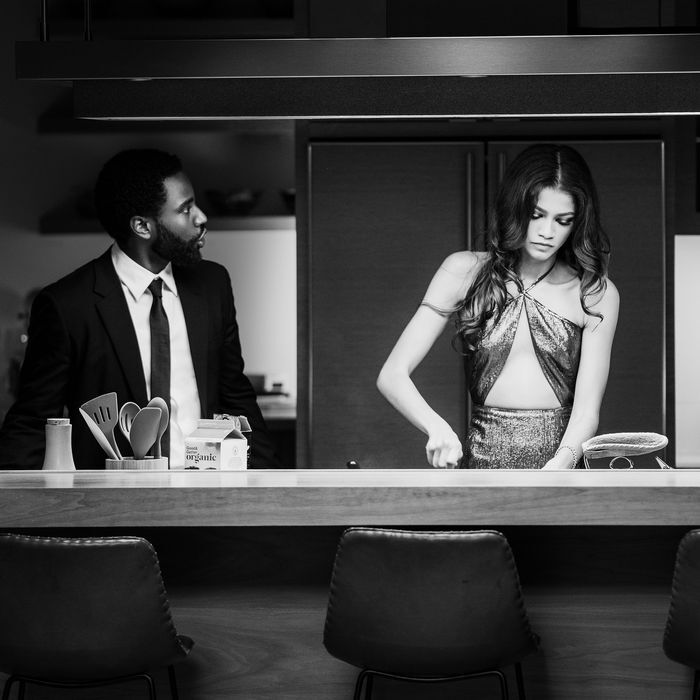Sam Levinson was ambitious when he wrote and directed “Malcolm & Marie.” However, the attempts to create multiple layers of the characters contribute to the movie falling flat. Levinson presents the complex argument between Malcolm, played by John David Washington, and Marie, played by Zendaya, as he portrays different perspectives toward politics and race. As Levinson seems to voice his personal beliefs through Malcolm’s character, the arguments become less convincing.
The film attempts to display Malcolm and Marie’s perspectives as a Black director and actress, respectively. This portrayal brings forth a question: is it possible for a white director to properly voice the hardships faced by a Black director and Black actress?
“Malcolm & Marie” was released on Feb. 5 for all Netflix subscribers to enjoy. The film aimed to follow social distancing protocols and was shot entirely in one house. The black-and-white movie brings an interesting blend of vintage and modern-day film. As Levinson brought out the ways in which arguments are construed as black and white, the shooting of the film was fitting.
Levinson’s film is innovative and shows how each argument, whether it be in regard to politics, race, gender or love, is complex. After Malcolm and Marie return home from Malcolm’s film debut, their exhaustingly long argument begins. Marie says, “You forgot to thank me, Malcolm. It’s not a minor fucking detail. That’s a big one,” in the conversation about his speech at the debut. This leads to an argument that lasts the entirety of the film.
Within this argument, details of both characters are revealed. The audience learns of Marie’s struggle with addiction. Marie suggests that Malcolm’s film is inspired by her life because the main character of his film, Imani, is a 20-year-old who struggles with addiction. Later, Malcolm responds by saying “Imani is based on you as much as she is on me.”
Malcolm validates his argument by mentioning how aspects of Imani are based on his past partners and family members. Malcolm belittles Marie as he describes his past lovers in detail. Zendaya beautifully conveys the emotions felt by Marie in this scene as she is verbally abused while naked and vulnerable in a bathtub.
This scene brings out the questioning of Marie’s sanity and stability as a character. Yet, later scenes complicate this narrative. Malcolm receives his review from “the white girl from LA Times.” He says, “Imani is placed under 5150, a term for people being held against their will and being a danger to themselves and others, after a harrowing scene with a pair of nail scissors.”
The story is complicated and again viewers are left to sift through contradictory information because Malcolm previously described Marie’s attempt to slit her wrists with a pair of nail scissors. Through this scene, Imani’s character and the inspiration behind it are given further complexity. Levinson clarifies that Marie is not delusional in her saying that Imani is based on her and again the audience is left questioning whose argument is justifiable.
Levinson complicates the simple black and white interpretation as he leaves the viewers to question who is “right” or “wrong” by the end of the film. The audience is left to conclude for themselves which aspects of Malcolm and Marie’s arguments are valid. Levinson’s film is thought-provoking and, in many ways, brilliant. The characters are brought forth and understood through a long argument taking place within one house. Levinson manages to take the simplicity of his setting and counteract the effect this brings on audience members. Rather than feeling a lack of scene and character development, the characters are better understood with each added layer of the argument.
Towards the end of the film, it is evident that Malcolm and Marie love each other, yet their love is fragile and may get in the way of happiness. Marie plays “Get Rid of Him” by Dionne Warwick, which represents the toxicity that sometimes occurs in love. It works with the scene as Malcolm and Marie’s unhealthy relationship is unhealthy, but they clearly love each other.
Every simple interpretation of the film is deconstructed. At times, the characters contradict their own arguments, and at times they go against each other. Levinson conveys the ways in which all arguments may be complicated. However, he also puts forth a larger societal issue — people tend to interpret things as black and white. Rather than find common ground, people are more likely to argue and tear an entire opinion down.
Malcolm is wrong for forgetting to thank Marie, but perhaps if Marie had expressed her yearning to play Imani, the argument would have been avoided as a whole. After watching the film, it is easy to question who is in the right or wrong. These questions may accomplish what Levinson had set out to do — bringing forth a conversation around his film.



